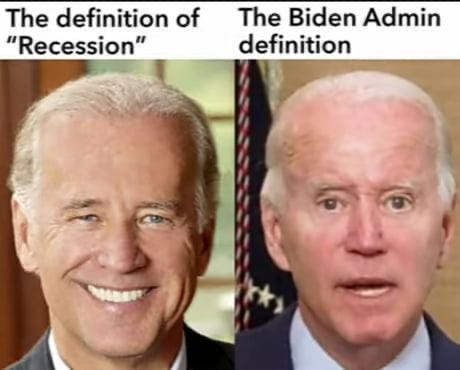The US Is Not Not In A Recession
Friday August 5, 2022 - Issue # 18
Yeah, as the title of this piece states, the US is NOT in a recession.
Scratch that. One of the only things I remember from my macroeconomics courses in uni was that two consecutive quarters of negative growth is considered a recession. Leading up to the official GDP numbers last week, the topic on everyone’s mind was whether or not the US was in a recession. It was painful watching White House representatives dance around the issue and it was pretty clear that they were going to go down with the ship by refusing to acknowledge the former definition of a recession since it didn’t fit their desired narrative.
I’m not sure how much “technically” being in a recession matters anyway…I just wanted to make mention that this trend of global leaders twisting the truth in hopes that they can buy more time to try and figure stuff out has become exponentially more prevalent. Remember when inflation was just transitory?
Over the past ~8 months the market has been patiently waiting for the Fed to express more concern over economic growth than inflation. At the FOMC meeting last Wednesday, the Fed gave the market it’s first glimpse of a signal that they might shift their policies to support growth over inflation.
As the stance of monetary policy tightens further, it likely will become appropriate to slow the pace of increases while we assess how our cumulative policy adjustments are affecting the economy and inflation.
A direct quote from Jerome Powell’s prepared remarks at last Wednesday’s FOMC meeting. He is pointing to concerns about how rising rates are impacting the American economy…and inflation. Hmm.
It is not hard to see that the US is a completely financialized economy. Credit is the driving force behind the largest portion of expenditures — homes, autos, and increasingly Buy Now Pay Later (BNPL) offerings from new fintechs — show us that households have resorted more and more to using credit to finance their existence.
Homes and cars are examples of assets that must be financed for the overwhelming majority of Americans. Therefore, the economy is completely tied to interest rates. Over time, the US forced the financialization of nearly all aspects of life on its citizens and the Fed is in complete control over household balance sheets (assuming wages are not increasing at the same rate - they’re not). If they raise rates (making money more expensive), monthly payments on outstanding loans (homes, autos, BNPL and other forms of credit) increase, if they cut rates (making money cheaper) monthly payments on outstanding loans decrease.
Banks play a crucial role in the middle of the Central Bank and civilians as they are in charge of distributing the loans. Banks make a spread between their cost of capital and what they charge on mortgages and other loans. If people can’t afford their monthly payments — they might be fine now but with another hike or two in the pipe and a sustainable period of much higher than normal monthly payments — people will be forced to sell their homes or default. At the same time, it will be tougher for people to buy houses, cars, etc., because banks will become more conservative with who they lend money to and what they lend it against. These two ideas combined have the potential to create a deflationary spiral which, in a fractional reserve banking system is a no-go.
Pardon my rudimentary take on essentially how the world goes round — it’s an easy way for me to separate the noise from the great probability that the Fed will have to reverse course sometime soon to cure the economy’s (dope) sickness.
In my last piece I explained how all of this ties back into Bitcoin and crypto from a price perspective — in short, we go higher when the Fed pivots.
Crypto is top of mind for regulators
There are now multiple bipartisan bills working towards crypto regulation in the US. The Digital Commodities Consumer Protection Act bill, which was launched this Wednesday reinforces the role of the Commodity Futures Trading Commission (CFTC) in overseeing the cryptocurrency sector. Senators Stabenow and Boozman have been pressing hard to strengthen regulatory frameworks around cryptocurrencies.
Even the UK, which has traditionally been a pretty nasty place for crypto from a regulatory perspective, has been taking steps toward being more hospitable for crypto. On Thursday, the Crypto and Digital Assets All Party Parliamentary Group (APPG) announced that it will be launching an inquiry to define the role of the Bank of England and the Financial Conduct Authority (FCA) in relation to crypto as well as to explore implications around Central Bank Digital Currencies (CBDCs). This is off the back of the UK crypto sector noticing an increased interest from consumers and regulators as the number of people who now own some form of cryptocurrency or digital asset has grown in recent years.
The other jurisdictional “whale” worth noting is Japan who has also been making moves on the regulatory side. The Japan Crypto-Asset Business Association (JCBA) and the Japan Crypto-Asset Exchange Association (JVCEA) released a tax reform request that calls for lowering taxes for individual investors on crypto earnings. The 20% separate tax on crypto earnings with an exemption on unrealized gains would be a game changer for crypto investors in Japan who currently face up to 55% in taxes on their crypto investments.


